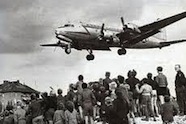HNN Hot Topics: Veterans Day
 |
Veterans Day, Ninety-Five Years On The enduring folly of the Battle of the Somme. NOVEMBER 11, 2013 |
.jpg) |
Veterans Day in Ireland For one thing, it's not Veterans Day, it's Remembrance Day. For another, it's not an official holiday, even though some 200,000 Irishman fought in World War I. NOVEMBER 11, 2013 |
 |
Prepare to Welcome Our Troops Home from Afghanistan America's longest war will soon be over. NOVEMBER 11, 2013 |
 |
This Veterans Day, Beware the Dangers of Robot War This Veterans Day, we need to turn away from the false promise of robot weaponry NOVEMBER 12, 2012 |
 |
Veterans Day is a Time for Love for One's Country What can be said on Veterans Day 2011 that has not been said repeatedly over our years of remembering war and that final peace? NOVEMBER 11, 2011 |
 |
This Veterans Day, Let's Reflect on the D.C. War Memorial We should celebrate the newly-restored District of Columbia War Memorial. NOVEMBER 7, 2011 |
 |
Remembering Generosity and Commitment this Veterans Day Let's remember that America's veterans have often exhibited remarkable generosity of spirit and awe-inspiring levels of commitment. NOVEMBER 11, 2010 |
 |
Honoring Indian Veterans This Veterans Day More than 44,000 Indians served in World War II. NOVEMBER 7, 2010 |
 |
Keeping Veterans Day Alive Veterans Day celebrations are in retrenchment all over the country. NOVEMBER 1, 2009 |
 |
This Veterans Day Let's Hear from the Troops Themselves This years Veterans Day comes in the wake of fierce political campaigning over which policies best serve the interest of U.S. soldiers. NOVEMBER 10, 2006 |
- John Arquilla: Casualties of History ... The Thing We Shouldn't Forget About the Origins of Veterans Day (11-9-12)
- Patrick Logan: On Veterans Day, Recalling Dreams Sacrificed (11-10-10)
- Veterans Day Marks Efforts to Honor and Preserve Veterans History (10-22-10)
- Curtis Flood: A Navy Lieutenant's Reflections on Veterans Day, 2009 (11-15-09)
- Bob Richards: Veterans Day or Rulers Day? (11-11-09)
- Navajo Code Talkers to Walk in NYC Veterans Day Parade (11-11-09)
- Rasmussen Report: 28% Say Today's Veterans Face More Challenges Than Vietnam Returnees (11-9-09)
- Alexander Watson: A Holiday to End All Wars (11-10-08)
- Dan Todman: How We Remember Them: The 1914-18 War Today (11-7-08)11-9-0911-9-09)
- Juan Cole: Gloomy Veterans Day Post (11-12-07)
- San Francisco Chronicle celebrates an unusual vet on Veterans Day: Lawrence Ferlinghetti (11-11-06)
- Kenneth T. Jackson: "From These Honored Dead:" Memorial Day and Veterans Day in American History (6-1-05)
- Veterans Day '05 [1min] (11-12-05)
- Veterans Day/WWI Armistice [50min] (11-12-05)
- Veterans Day Commemorations in Washington, D.C. [3min] (11-11-05)
- Clarence Page: My Changing Views of Veterans Day [3min] (11-11-05)